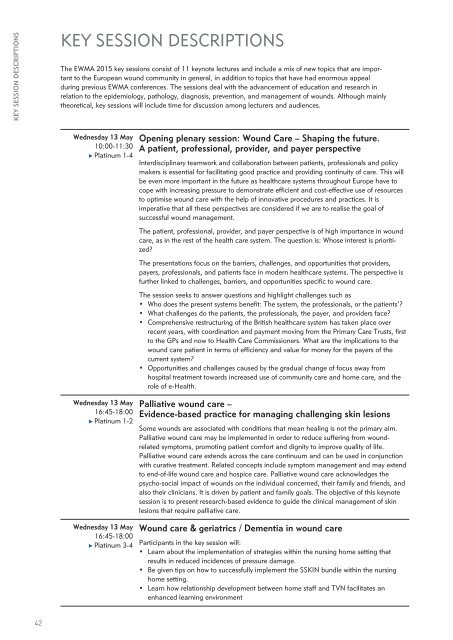Create successful ePaper yourself
Turn your PDF publications into a flip-book with our unique Google optimized e-Paper software.
KEY SESSION DESCRIPTIONS<br />
KEY SESSION DESCRIPTIONS<br />
The EWMA 2015 key sessions consist of 11 keynote lectures and include a mix of new topics that are important<br />
to the European wound community in general, in addition to topics that have had enormous appeal<br />
during previous EWMA conferences. The sessions deal with the advancement of education and research in<br />
relation to the epidemiology, pathology, diagnosis, prevention, and management of wounds. Although mainly<br />
theoretical, key sessions will include time for discussion among lecturers and audiences.<br />
Wednesday 13 May<br />
10:00-11:30<br />
Platinum 1-4<br />
Wednesday 13 May<br />
16:45-18:00<br />
Platinum 1-2<br />
Wednesday 13 May<br />
16:45-18:00<br />
Platinum 3-4<br />
Opening plenary session: Wound Care – Shaping the future.<br />
A patient, professional, provider, and payer perspective<br />
Interdisciplinary teamwork and collaboration between patients, professionals and policy<br />
makers is essential for facilitating good practice and providing continuity of care. This will<br />
be even more important in the future as healthcare systems throughout Europe have to<br />
cope with increasing pressure to demonstrate efficient and cost-effective use of resources<br />
to optimise wound care with the help of innovative procedures and practices. It is<br />
imperative that all these perspectives are considered if we are to realise the goal of<br />
successful wound management.<br />
The patient, professional, provider, and payer perspective is of high importance in wound<br />
care, as in the rest of the health care system. The question is: Whose interest is prioritized?<br />
The presentations focus on the barriers, challenges, and opportunities that providers,<br />
payers, professionals, and patients face in modern healthcare systems. The perspective is<br />
further linked to challenges, barriers, and opportunities specific to wound care.<br />
The session seeks to answer questions and highlight challenges such as<br />
• Who does the present systems benefit: The system, the professionals, or the patients’?<br />
• What challenges do the patients, the professionals, the payer, and providers face?<br />
• Comprehensive restructuring of the British healthcare system has taken place over<br />
recent years, with coordination and payment moving from the Primary Care Trusts, first<br />
to the GPs and now to Health Care Commissioners. What are the implications to the<br />
wound care patient in terms of efficiency and value for money for the payers of the<br />
current system?<br />
• Opportunities and challenges caused by the gradual change of focus away from<br />
hospital treatment towards increased use of community care and home care, and the<br />
role of e-Health.<br />
Palliative wound care –<br />
Evidence-based practice for managing challenging skin lesions<br />
Some wounds are associated with conditions that mean healing is not the primary aim.<br />
Palliative wound care may be implemented in order to reduce suffering from woundrelated<br />
symptoms, promoting patient comfort and dignity to improve quality of life.<br />
Palliative wound care extends across the care continuum and can be used in conjunction<br />
with curative treatment. Related concepts include symptom management and may extend<br />
to end-of-life wound care and hospice care. Palliative wound care acknowledges the<br />
psycho-social impact of wounds on the individual concerned, their family and friends, and<br />
also their clinicians. It is driven by patient and family goals. The objective of this keynote<br />
session is to present research-based evidence to guide the clinical management of skin<br />
lesions that require palliative care.<br />
Wound care & geriatrics / Dementia in wound care<br />
Participants in the key session will:<br />
• Learn about the implementation of strategies within the nursing home setting that<br />
results in reduced incidences of pressure damage.<br />
• Be given tips on how to successfully implement the SSKIN bundle within the nursing<br />
home setting.<br />
• Learn how relationship development between home staff and TVN facilitates an<br />
enhanced learning environment<br />
42


